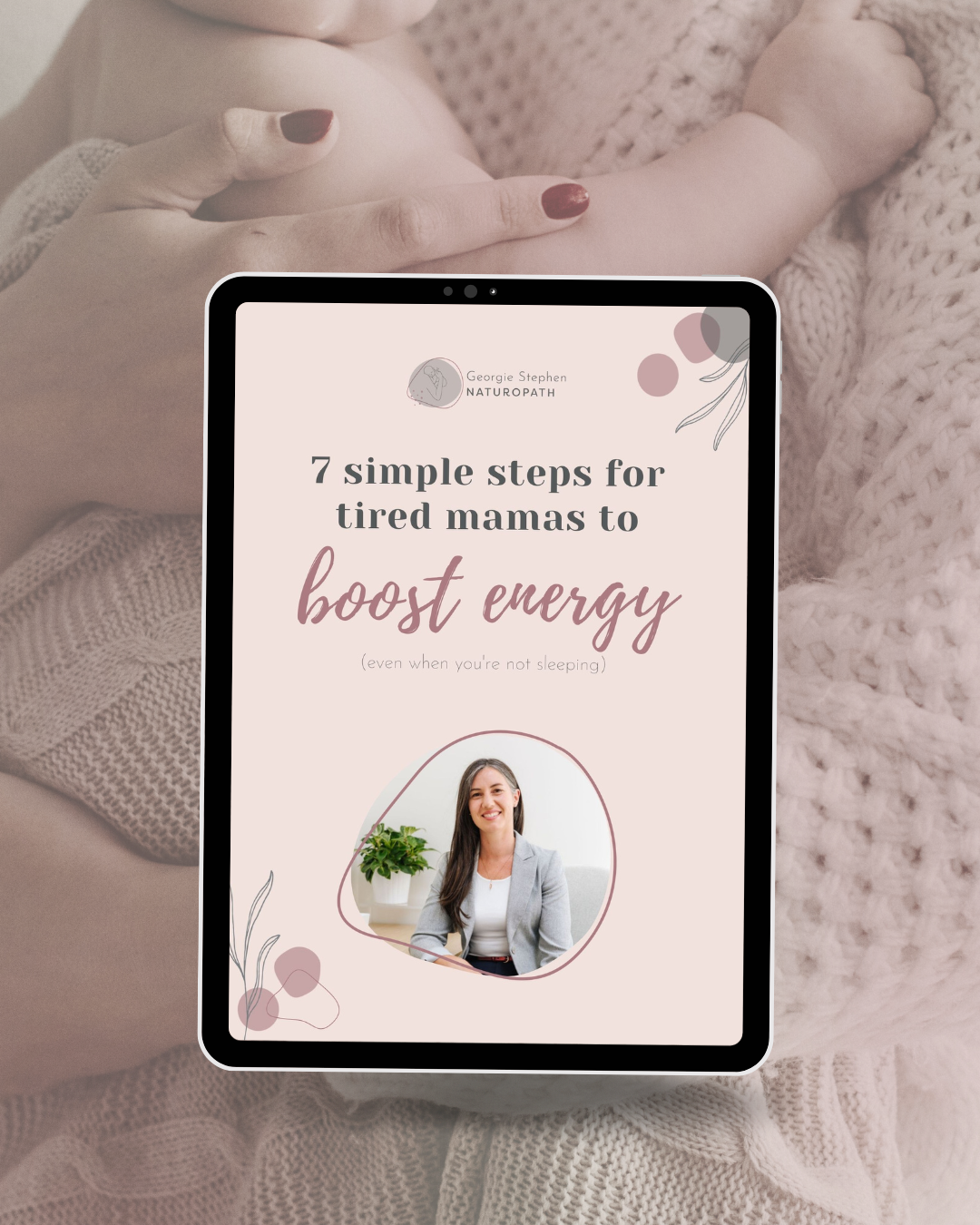Feeling blurry-eyed, foggy headed, and utterly exhausted from the moment you get up in the morning to that much-awaited moment your finally get to lie down at the end of the day? And this coupled with the ongoing demands of caring for young children and managing the mental load of motherhood is leaving you struggling to think clearly about what steps to take in this current season of tired to support yourself and protect your own wellbeing through the storm of broken sleep.
The impacts of broken sleep are no joke and can affect your physical and mental health in so many ways. It can hit you all at once after a few rough nights or creep up on you as you navigate night after night with your wakeful baby or toddler. Either way, the impacts can make it impossible to think clearly about what you need to do to survive.
In this blog, I’m going to take all the work out of it for you and walk you through the 5 most important steps you can take when you need to put on your broken sleep-lifejacket!
Disclaimer:
The information provided in this blog is for your personal or other non-commercial, educational purposes. It should not be considered as medical or professional advice. We recommend you consult with a GP or other healthcare professional before taking or omitting to take any action based on this blog. While the author uses best endeavours to provide accurate and true content, the author makes no guarantees or promises and assumes no liability regarding the accuracy, reliability or completeness of the information presented. The information, opinions, and recommendations presented in this blog are for general information only and any reliance on the information provided in this blog is done at your own risk.
Step 1: Go to bed early enough
This one is so simple and obvious that I’m sure you’ve thought about it yourself or heard it before elsewhere. Yet, it’s rarely simple to implement. Many mothers I support are not going to bed early enough given the circumstance they are in regarding sleep and it’s understandable why – often the hours after your child’s bedtime are the only hours during the entire day you might have to think straight or do something for yourself. But the hard truth of it is that in certain seasons, you might have to come to a compromise between that time in the evening and resting & restoring your body with extra sleep.
Don’t underestimate the positive impact even an extra hour or two in bed at night can have on your wellbeing the next day. The Netflix show will still be there in a few months when sleep has calmed down!
Aim to allow yourself a large enough window of opportunity in bed to make up for what’s lost overnight. This often means going to bed much earlier than usual – most mothers benefit from aiming for a 9:30 pm bedtime.
You can work out what an ideal bedtime is for you by starting with your typical wake-up time (usually dictated by your child/ren or your typical daily routine). Then, you can work backward from here to see what time will work best for you right now, using the recommended 7-9 hours sleep as the guide.
Here is an example:
If you typically wake up at 6am, to get a minimum of 7 hours sleep you’d need to be asleep by 11pm. But your baby wakes multiple times throughout the night, requiring resettling, meaning you may want to add 1-2 extra hours to account for these overnight wakes. This takes your bedtime to between 9pm-10pm.
But what about that precious personal time, I hear you ask?!
Yes, I agree it’s important.
You need to make a plan with your partner or other support person to get personal time elsewhere in your day or week – e.g. 30 minutes (or however long you can manage) in the morning before partner leaves for work or in the evening when they get home from work, or having a few protected personal hours on the weekend that are just for you to fill up your own cup.

Step 2: Set up flexible nighttime arrangements
Perhaps this is how you imagined motherhood would be – you lay your child down in their crib, cot, or bed, kiss them goodnight, turn off the light, and walk into your own room to have a peaceful night’s sleep yourself. You’re certainly not alone if you did, and yet this is only a reality for a few select parents because a majority of babies and young children require very hands-on, responsive care during the night for at least the first year or two.
There is no saying how long the broken sleep will last – you might be lucky and find it’s just a short rough patch or you might need to strap in for the long haul of frequent night wakes. So, if you don’t already have some flexible, creative nighttime arrangements set up in your home to navigate these patches, now is the time to consider it.
Try to reduce the amount of effort you need to exert to resettle or comfort your child by moving closer to them at night, either within the same room (cosleeping; either theirs or yours) or in the same bed (bedsharing).
Resources for safe bedsharing can be found here:
- Safe Infant Sleep by Dr James McKenna
- Safe Cosleeping Guidelines
- The Cosleepy Blog
- The Safe Sleep Seven (La Leche League)
- Cosleeping (Australian Breastfeeding Association)
Share the load of nighttime parenting by taking split shifts across the night with your partner, where you’re each on duty for one half of the night, or alternating nights.
If these options aren’t suitable, consider having one or two nights a week where someone else is available to help you at night – to maximise your opportunity for rest, e.g. on the weekend. Or try to find some mornings where you can sleep in and someone else can get your baby or children up while you continue resting.
Every family dynamic and baby & child is different, so what works for your family will be very personal. Try to remain flexible and creative with how you go about your nights so you maximise your rest and sleep, as it’s crucial for helping you survive these wakeful phases.
Step 3: Get outside for morning sunlight asap after waking
Does this pattern sound at all familiar? Exhausted, foggy, and unrefreshed in the morning, energy crashing in the afternoon, and feeling wired at night or getting a second wind after dark? These are all classic signs of a body clock that is out of balance.
Ongoing broken sleep can significantly impact your circadian rhythm, aka your internal body clock, and this disruption can greatly affect your energy levels, focus & cognition, appetite, and sleep quality.
One of the simplest ways you can protect or re-establish your body clock during this time is by getting some morning sunlight exposure. Sunlight is one of the most powerful external cues that influences your body clock – it sends a signal to your body saying “it’s morning, wake up!” which triggers a cascade of hormonal reactions that starts to energise your body and activate more alertness. Biologically speaking, your body is expecting to see the sun as soon as you wake up.
Aim for at least 10 minutes outside in the morning with eyes exposed, as soon as possible after waking, but at least within the first 60 minutes.
// FREE GUIDE //
7 simple steps for tired mamas to boost energy
(even when you’re not sleeping)

Step 4: Eat a protein-rich, savoury breakfast
You wake up in the morning (tired, of course) and you drag yourself into the kitchen to think about breakfast. Not only is your fatigue making it hard to find the motivation for food preparation, but most likely your appetite is telling you to have something high-carb, starchy, or sweet. Maybe the first thing you reach for is your morning coffee, followed shortly by something easy like toast or cereal or porridge.
One significant way that our physical health is impacted by ongoing broken sleep is that our blood sugar control system becomes dysregulated. We become more insulin resistant, which means your body is very sensitive to changes in blood sugar levels and it will have a hard time getting the glucose from the bloodstream into the cells that need it for energy (along with virtually every other foundational body function).
Glucose is the energy currency in the body and sadly sleep deprivation is really bad news for this whole system. This can result in symptoms like brain fog, irritability, sugar cravings, difficulty concentrating, energy crashes, and low energy.
Those cravings for high-carb or sugary foods are, in most cases, driven by both the exhaustion and blood sugar dysregulation caused by broken sleep. And frustratingly, the worst thing we can do for our blood sugar system when it’s in this state is consume a breakfast that is high-carb or sweet or start the morning with coffee (or caffeine) first and foremost.
On the other hand, a protein-rich, savoury breakfast (before coffee) is ideal for counteracting these impacts because protein keeps your blood sugar very stable (not too high and not too low, just right) and a savoury breakfast contains little-to-no simple sugar, reducing the chance of any blood sugar spikes and crashes
The end result of regularly having this kind of breakfast is that you’re usually fuller for longer across the morning, your energy is as stable as possible, with better cognition and mood, less brain fog, and reduced cravings.
Learn more about the value of a protein-rich breakfast (with food ideas) here.
Step 5: Get comfortable with saying no
When you’re in the thick of broken sleep, the demands on your body & mind are huge. One of your primary goals during this time is to reduce any additional demands beyond tending to your own basic needs and your child or childrens basic needs to lighten the overall workload on you.
Sometimes, in order to create this space, you have to say no to other people and obligations, as well as learn to say no to yourself (to the inner part of you that feels the need to be go-go-go or always be doing or achieving, instead of resting or slowing down).
Setting boundaries with others and yourself allows you to take back more control of your time and energy, and preserve your wellbeing as much as possible through this tired season.
By saying no to obligations, responsibilities, or additional demands whenever possible, you are giving yourself the permission to switch off and you’re nurturing your nervous system (a system that is under a lot of stress during ongoing periods of broken sleep).
This can be a difficult strategy for many mothers because so many of us were brought up with ‘good girl’ conditioning, or the social expectations that ‘good’ girls and women are accommodating, obedient, and self-sacrificing, among other things (read more about this and the myth of the perfect mother here).
But these types of beliefs likely won’t serve you in motherhood, because they only push you further and further towards burnout, especially while sleep deprived.
During this sleep-deprived season, here are some ways you can say NO more often:
- Decline invitations when you’re in a rough patch with sleep, unless you know it will be something that energises you, i.e. a catch up with you mum-friend besties
- Reschedule or cancel non-essential plans that you don’t feel up to
- Only spend time with people who fill up your cup, not drain it. Say no to others who drain you or take energy from you
- Question any of your own thoughts or beliefs that push you to be productive, busy, or in ‘doing’ mode, rather than resting or slowing down
- Pause or let go of unnecessary responsibilities at this time
- Asking for help from a partner, family, or support person is a form of saying NO to your good girl conditioning, which says you should do it all yourself

Next steps
If you’re currently in the thick of unrelenting broken sleep and struggling to tell which way is up or down, let alone what you need to be doing to support yourself through the storm, these are the first steps you should take to preserve your own wellbeing.
But also know that these steps are just the beginning – there are so many ways you can take back the reins of control of your health and energy through broken sleep, so if you’re already familiar with these strategies there is plenty more you can do beyond these initial (albeit important) steps.
Often, knowing what to do and actually implementing it are two very different things, especially when you’re exhausted and overwhelmed, which is where having someone in your corner to guide you, support you, and cheer you on can be so helpful.
Let me know in the comments below which step you’re going to take today to support yourself or reach out with any questions if you’d like some extra support along the way.
You can learn more about working with me in these ways here.
Disclaimer:
The information provided in this blog is for your personal or other non-commercial, educational purposes. It should not be considered as medical or professional advice. We recommend you consult with a GP or other healthcare professional before taking or omitting to take any action based on this blog. While the author uses best endeavours to provide accurate and true content, the author makes no guarantees or promises and assumes no liability regarding the accuracy, reliability or completeness of the information presented. The information, opinions, and recommendations presented in this blog are for general information only and any reliance on the information provided in this blog is done at your own risk.


0 Comments